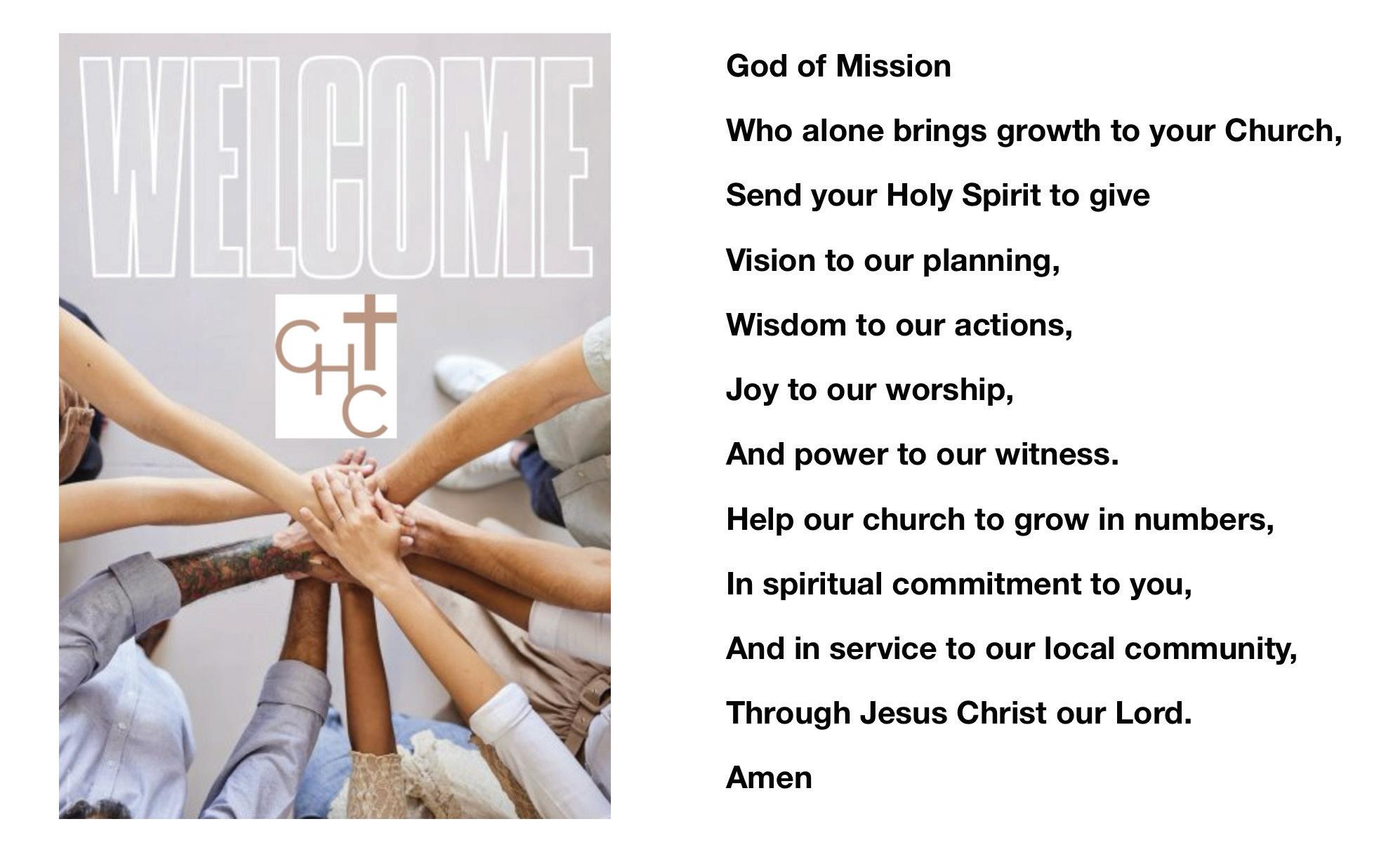MARCH

COURT HEY METHODIST CHURCH




‘Look ahead and believe’
Growing up in rural areas of Zimbabwe taught me many lessons of life that I cherish now. One of them happened as I was growing up as a young boy, in my childhood in which me, my siblings and my mother used to work in the fields. I recall, it was late in the morning, the sun was up, and we had been hoeing for what I thought to be a very long time. I stopped to look back at what we had accomplished and said to my mother, “Look at all we have done!’” my mother didn’t respond right away. After repeating three times,my mother replied, “Clement, in life never look back. Look ahead at what we still have to do.” She pointed to the vast area which we had not touched that lay ahead.
My focus was on what we had covered but hers was what we were expected to cover. This is a great lesson! We spend so much time in our lives, looking at our past. We fall into the trap of either beating up on ourselves for things or we give ourselves too much credit.

Perhaps the simple lesson from my mother is that ‘the past is to be learned from but not lived in.’ That is so hard. Trying to live in the present and not dwell on the past has been something I have struggled with. Maybe, we remember the past so that we, hopefully, don’t make the same mistakes again.
The other side of it is that we can’t spend all of time thinking about what may or may not happen. We can’t consume our time worrying about whether things will work out the way they should. I leant that I should ‘look forward and believe’. We have to have faith that the Lord knows what is best for us and, and things will work out.
God Bless Clement

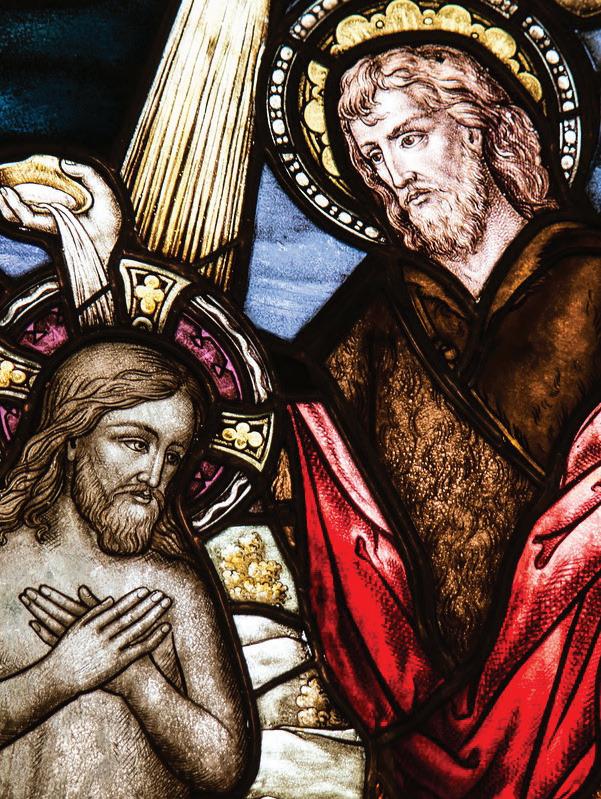

Reverend Dr Clement Matarirano
Hi, my name is Clement and I’m a Minister here at Court Hey Methodist Church. I moved to the UK from Zimbabwe with my Family in 2020 to serve here at: Court Hey Methodist Church.

Lent is a significant and solemn period in the Christian calendar that serves as a time of preparation and reflection leading up to Easter Sunday. This observance lasts approximately 40 days, symbolising the 40 days that Jesus spent fasting in the wilderness. Lent begins with Ash Wednesday, involves practices like fasting and abstinence, and encourages penance and spiritual growth.It is marked by the liturgical colour purple and culminates in Holy Week, concluding with the joyous celebration of Easter, which commemorates the resurrection of Jesus Christ.
1. Religious observance leading to Easter.
Lent is a significant religious observance in the Christian calendar. It serves as a period of preparation and reflection leading up to Easter Sunday, the most important day in Christianity. Easter commemorates the resurrection of Jesus Christ from the dead, a central event that signifies the triumph of life over death and sin. Lent’s timing is carefully calculated to prepare believers spiritually for this momentous occasion.
2. Lasts approximately 40 days.
Lent traditionally lasts for approximately 40 days, excluding Sundays. This duration is symbolic and mirrors the 40 days that Jesus spent fasting and praying in the wilderness, as described in the Gospels of Matthew, Mark, and Luke. During this time, Christians are encouraged to engage in acts of self-discipline, reflection, and penance as a way to draw closer to God and prepare for the Easter celebration.

3. Symbolises Jesus’ 40-day fast.
The 40-day duration of Lent directly references Jesus’ period of fasting and temptation in the wilderness. According to the Gospels, Jesus retreated into the wilderness after his baptism and before beginning his public ministry.
During this time, he fasted and faced temptations from the devil. Lent encourages believers to emulate Jesus’ spiritual journey by engaging in various forms of self-denial, self-examination, and prayer. It is seen as an opportunity for Christians to draw nearer to God and strengthen their faith, just as Jesus did during his 40 days in the wilderness.
4. Begins with Ash Wednesday.
Lent officially commences with Ash Wednesday, which is the day after Shrove Tuesday (also known as Pancake Day). On Ash Wednesday, Christians attend church services where they receive ashes on their foreheads in the shape of a cross. These ashes are typically made by burning palm branches from the previous year’s Palm Sunday celebrations. The ashes symbolise both mortality (ashes to ashes, dust to dust) and penance, reminding believers of their need for repentance and forgiveness as they begin their Lenten journey.
5. Involves fasting and abstinence.
Fasting and abstinence are common practices during Lent. Fasting often involves abstaining from specific foods, reducing meal sizes, or even fasting from food altogether for a designated period. Abstinence, on the other hand, typically involves refraining from certain indulgences or pleasures. For example, many Christians abstain from eating meat on Fridays during Lent as a form of penance and reflection. The specific fasting and abstinence practices can vary among different Christian denominations and even among individual believers, but the overarching goal is to cultivate self-discipline and spiritual growth.

6. Penitential season for reflection and growth
Lent is fundamentally a penitential season, meaning it is a time for believers to reflect on their sins, seek forgiveness, and undergo spiritual transformation. Christians often engage in acts of charity, prayer, and self-discipline to deepen their relationship with God.
This may include attending additional church services, participating in Bible studies, volunteering for charitable causes, and setting aside more time for personal prayer and meditation. Lent encourages believers to confront their shortcomings and strive for greater holiness, with the ultimate aim of renewing their faith and preparing for the joyful celebration of Easter, when the resurrection of Jesus is commemorated.
7. Purple is the liturgical colour.
Purple is the liturgical colour associated with Lent. It is a symbol of penance, humility, and mourning. The use of purple vestments and decorations in churches during Lent underscores the sombre and reflective nature of this season. The colour serves as a visual reminder to believers of the need for self-examination, repentance, and spiritual renewal. In some traditions, rose-colored vestments may be used on Laetare Sunday, the fourth Sunday of Lent, as a symbol of joy and anticipation amidst the penitential season.
8. Sundays are not counted in the 40 days.
While Lent is traditionally a 40-day observance, Sundays are not included in this count. This exception is rooted in the celebration of the Resurrection of Jesus, which occurs on Easter Sunday. Sundays are considered days of celebration and rejoicing in the Christian faith, so fasting and certain Lenten practices are often relaxed on these days. As a result, Lent technically extends for 46 days, but the six Sundays during this period are excluded from the penitential discipline.

9. Penitential season for reflection and growth
The final week of Lent is known as Holy Week, and it holds special significance for Christians. Holy Week begins with Palm Sunday, commemorating Jesus’ triumphant entry into Jerusalem, and includes events such as Maundy Thursday (observing the Last Supper and the institution of the Eucharist), Good Friday (commemorating the crucifixion of Jesus), and Holy Saturday (a day of reflection and anticipation of Easter). Each of these days has its own distinct liturgical observances and rituals, marking the final stages of Lent and leading into the Easter celebration.
10. Concludes with Easter Sunday celebration.
Lent reaches its climax and conclusion with the celebration of Easter Sunday, which is the most important and joyous day in the Christian calendar. On this day, Christians gather to celebrate the resurrection of Jesus Christ from the dead, signifying the victory of life over death and the redemption of humanity from sin.
The season of Lent, with its emphasis on repentance and spiritual growth, prepares believers to fully appreciate the significance of Easter and the hope it brings. Many churches hold special worship services, Easter egg hunts, and festive gatherings to mark this momentous occasion. It is a time of great joy and gratitude for Christians around the world.

Silence freely chosen can be deeply restorative. But both life experiences and reflections on the Bible have taught us to see silence as a much broader and more nuanced concept. Sometimes we have to hold our tongues in order to allow others to speak. Beyond that we may need to discipline ourselves to listen to what people are saying, rather than be preparing our own next comments. Nor is silence always positive. Remaining silent in the face of injustice and deliberately silencing the voices of victims are often powerful instruments of oppression and abuse.
Scripture speaks too of God’s silence, a silence that Jesus experiences on the cross. Earlier the psalmists plead with God to break his silence, beseeching Israel’s Lord to intervene, so that the righteous can receive vindication and the wicked be punished. Our faith needs a basis for understanding why such divine silence is not a sign of God’s absence or lack of care for his people.
Some passages in the Bible take us through a wide range of how silence is depicted. Many are comforting; one or two may be, for some readers, disturbing. All are valuable in helping us to understand the role that silence plays in our faith. That in turn will help us to know and how best to embrace silence as part of our own spiritual practice, as well as when to speak.
(David Walker taken from New Daylight BRF)

(By David Walker, taken from New Daylight BRF)
Bible ref: Job 13:1-5,13.
Look my eye has seen all this ; my ear has heard and understood it. What you know; I also know; I’m not inferior to you. but I would speak to the almighty, and desire to argue my case with God. As for you, you white wash with lies; all of you are worthless physicians. If you would only keep silent, that would be your wisdom!! …..Let me have silence, and I will speak, and let come on me what may.
Job begins the book that bears his name, very wealthy and very blessed. Yet in a short season of disasters, he has seen everything dear to him snatched away. Three friends, traditionally referred to as ‘Job’s Comforters’, have come to speak with him. They offer all manner of conventional explanations for what has gone wrong. Somebody, usually, some outside individual or organisation, must be to blame, and be held to account. Yet what the sufferer often most needs is to express their emotions, to know they have been heard, not to have their feelings twisted either to rationalisation or revenge. Sometimes our role is to just sit in silence while people pour out their hearts. On occasions, sometimes it’s the proxy for God whom they wish to berate over what has befallen them. It is only, as the unfolding story bears out, when Job has his say with God, that real healing and understanding and restitution can follow.
Personal Prayer: Heavenly Father, help me this day to listen well, to know when to keep silence, so that others might speak, and refrain from offering words when words are not needed, so that those who truly need to speak can be heard and their voices carry both to earth and to heaven.

There once was a young boy with a very bad temper. The boy’s father wanted to teach him a lesson, so he gave him a bag of nails and told him that every time he lost his temper he must hammer a nail into their wooden fence.
On the first day of this lesson, the little boy had driven 37 nails into the fence. He was really mad!
Over the course of the next few weeks, the little boy began to control his anger, so the number of nails that were hammered into the fence dramatically decreased.
It wasn’t long before the little boy discovered it was easier to hold his temper than to drive those nails into the fence.
Then, the day finally came when the little boy didn’t lose his temper even once, and he became so proud of himself, he couldn’t wait to tell his father.
Pleased, his father suggested that he now pull out one nail for each day that he could hold his temper.
Several weeks went by and the day finally came when the young boy was able to tell his father that all the nails were gone.
Very gently, the father took his son by the hand and led him to the fence.
“You have done very well, my son,” he smiled, “but look at the holes in the fence. The fence will never be the same.”

The little boy listened carefully as his father continued to speak.
“When you say things in anger, they leave permanent scars just like these. And no matter how many times you say you’re sorry, the wounds will still be there.”
A few object lessons on controlling temper...
Bible Verses on Anger
Use these verses along with the fence story to teach a wonderful lesson on the importance of controlling our anger and God’s truth.
James 1:19-20 can be summed up in three words for quick recall“Quick, Slow, Slow.”
“This you know, my beloved brethren but everyone must be quick to hear, slow to speak and slow to anger; for the anger of man does not achieve the righteousness of God.”
Proverbs 16:32 -
“He who is slow to anger is better than the mighty, And he who rules his spirit, than he who captures a city.”
Ephesians 4:6-10 -
“Be angry, and yet do not sin; do not let the sun go down on your anger, and do not give the devil an opportunity.”

1. Plan your day.
2. Write everything you want to achieve in a day.
3. Write your goals on a physical paper.
4. Follow the 80/20 Rule. 20% of your work will bring you 80% of your results.
5. Stop miltitasking. Switching tasks significantly reduces your productivity.
6. Focus on one task at a time.
7. Remove all distractions from your environment.
8. When tired, take a nap.
9. Learn to say no. You will never have enough time if you say yes to everything.
10. Delegate all the non-important tasks.
11. Don’t wait for the perfect time. Do It Now.
12. Anything that can be done in under five minutes should be done now.
13. Do the task that you hate first.
14. Set deadlines, the task will never be finished without deadlines.
15. Stop focusing on things that don’t help you achieve your goals.
16. Don’t be a perfectionist when it;s not required.
17. Schedule a time when you’re going to check your email.
18. Avoid all unecessary mneetings.
19. Avoid negative people at all costs.
20. Do what you love

Pancake Day, also known as Shrove Tuesday, is a day celebrated around the world to mark the start of Lent. It’s an incredibly popular holiday, with millions of people taking part in the festivities. Let’s find out 10 fascinating facts about Pancake Day, from its history to its traditions. From the ingredients used to make the perfect pancake to pancake flips, get ready to be amazed!
1. Pancake Day is also known as Shrove Tuesday. It is also known as lots of different names across the world. In Germany they call it ‘Fastnacht’ which means ‘eve of the fast’. They call it Sprengidagur in Iceland which means ‘bursting day’!
2. Pancake Day is a Christian festival.
Pancake Day or Shrove Tuesday is actually a Christian Festival. It always falls on the Tuesday before the beginning of Lent. During Lent, some people give up things like chocolate and sweets. Pancake Day marks the last day they can eat these things before Lent starts.
3. It always falls 47 days before Easter. Did you know that although Pancake Day is on a Tuesday each year, it falls on different dates. It is always exactly 47 days before Easter!

4. The name ‘Shrove Tuesday’ comes from the word ‘shriving’.
Shrove Tuesday comes from the word ‘shriving’.
Shriving means listening to someone’s sins and then forgiving them. In the past Christians would use the day to confess their sins.
5. The first pancake day was in 1445.
It is believed that Pancake Day/Shrove Tuesday started in 1445 in Olney.
Olney is in Buckinghamshire, England.
A lady was getting carried away with making pancakes when she heard the church bells for the Shrove Tuesday mass.
She was late! The lady ran to the church with all of her pancakes and that’s where the pancake tradition started.
6. The most pancakes flips in a minute is 140!
It’s not Pancake Day without flipping your pancake!
According to the Guinness World Records, Brad Jolly from Australia has done the most flips of a pancake in one minute. He managed to flip the pancake 140 times.
Wow!

7. There are lots of different types of pancakes. There are lots of different types of pancakes and toppings. One of the most popular is lemon and sugar… but some people like chocolate spread or fruit!
Some people even have savoury pancakes. You might opt in for a crêpe or maybe even some American pancakes!
Yum!
8. Around 52 million eggs are used on Pancake Day!
In the UK, it is estimated that around 52 million eggs are used on the day! That is a lot of eggs!
9. The biggest pancake in the world was over 15 metres wide! The biggest ever pancake was made in Manchester. It won the Guinness World Record!
The pancake was over 15 metres wide, 2.5 centimetres thick and around 6 and a half pounds heavy!
10. You can make pancakes with only 3 ingredients! You don’t need many ingredients to make pancakes. All you need is flour, eggs and milk! Get 120 grams of plain flour and mix it with 2 eggs and 300ml of milk. There you have it, the perfect pancake mix!

Last year I took a trip to Vietnam and Cambodia. I wanted to try places that were very different in culture, language, lifestyle and climate. I got my wish.
Both countries were lovely. The people were very pleasant. Their way of life vastly different to ours and the climate was heaps better than the one I left behind. I should add I travelled in November to avoid excessive heat and the rainy season.
I travelled by car, coach, plane, boat, rickshaw, tuk tuk, foot and sampon. I discovered most people in those countries travel by scooter or moped. It was not unusual to see a moped loaded down with two adults and two or even three children.
How there wasn’t an accident on every street corner I have no idea, but there never was. It was a bit like a shoal of fish or a flock of birds... .they rode along at a pace right along side each other but never touched each other. My guide Chung told us that in his family they had four scooters for himself, his wife, his sister and his mum.
At night they were all put into the living room for safekeeping as they didn’t’t have a garage and the living room was on the ground floor of the four storey house where he lived with his wife, younger son (who at twelve didn’t have a scooter... yet.) mother, grandmother and sister.

Apparently it is very common in Vietnam for extended family to live together like that. Grandma had the ground floor bedroom (as she was the eldest) sister and mum had the second floor and Chung and his wife and son had the top floor. After giving out this information Chung was faced with a bus load of open mouthed white westerners to whom this idea was a complete unknown.
Also his grandmother spoke Russian as when she was young the country was ruled by Russia. His parents spoke French as they were young during the time of French governing. As for Chung and his wife and sons, they spoke Vietnamese and English. We learned that English was very important in Vietnam as a conduit to opportunities. You could get a better job / wages if you spoke English so lots of children were sent to “English School” after their usual school day or at weekends to facilitate this.
We bumped into lots of these schools when we went to places of interest. Their teachers would bring them so they had the chance to speak to English speaking tourists. Clever teachers! Clever eager children!
Chung’s eldest son had mastered English so well he attended Bristol University. Apparently it’s a great thing to be able to send your children abroad to attend an all - English speaking university and Chung was very proud of this achievement.
However it was not without its dangers. Whilst at Bristol, Chung Junior had formed an attachment to an English girl. The romance progressed to the point where the Chung parents were very worried that the young man would marry the girl and make England his home. This would be a disaster as Chung Junior needed to be available to take on the responsibility of “Head of the Family.”

This role we learned always had to be assumed by the eldest male. Chung got the position when his father died and what would happen if his eldest wasn’t available when he died? I got the feeling that quite a bit of pressure was applied to “encourage” the young man to come home. He now has a job, home and girlfriend in Hanoi and no desire to leave - much to the relief of his parents.
Elders or ancestors are extremely important in Vietnamese culture and every home contains a shrine where they can be worshipped and thanked on a daily basis. We saw lots of these shrines in temples and they were always beautifully decorated with fruit, rice, vegetables and flowers, plus of course candles and incense.
We also discovered that you had to be constantly careful not to disturb or alert “evil spirits”. This meant that you had to give your children (the most precious beings in your life) nicknames to use on a daily basis while they were young. Chung had called his older son “Dirty Bottom” and the younger one was “Slobber Mouth.” Evil spirits were then duped into believing that you didn’t like or value children that you referred to with such names and so they would leave them alone!
No darling / sweet heart / love in Vietnam folks!
Cheryl Rimmer

A radical is anyone whose opinions differ radically from mine.
People will wrangle for religion; write for it; die for it; anything but live for it. Some people have just enough religion to make them uncomfortable. The worst moment for the atheist is when they are really thankful, and have nobody to thank.
A religion that costs nothing does nothing. The religion of some people is well developed at thy mouth, but lame at the hands and feet.
The heart of revival. Is the revival of the heart.

Sunday
10.30am. Morning Worship Rev Clement Matarirano
0151 216 1170
Monday
9.45am Tai Chi
Liz Lloyd 0151 489 8076
11.00am Line Dancing Margaret Sharp 07727 682 610
2.00pm Craft Group Contact Jenny Rayner 0151 428 0205
4.00pm AJM School of Dance & Drama. Alisha McGinn 07754 534 252
Tuesday
10.00am Sing and Sign
Beth Kophemal 07841 446 247
5.30pm Rainbows www.girlguiding.org.uk 07599 431 195
6.30pm Brownies www.girlguiding.org.uk
6.30pm Guides www.girlguiding.org.uk

Wednesday
10.00am - 11.00am Qi Gong Barbara Shields 07944 662 109
1.30-3.30p.m. Tea Dance Margaret Diggle 0151 421 1794 07516 814 013
4.00pm AJM School of Dance & Drama. Alisha McGinn 07754 534 252
Thursday
9.30am Toddler Group Sue Canavan. 07746 407217
1.30p.m. Mamafit Rob Lunn Email rob.lunn@mamafituk.com
4.00pm AJM Alisha McGinn 07754 534 252
6.30pm Boys Brigade Liz Lloyd. 0151 489 8076
Friday
10.00am - 12.00 noon Place of Welcome Andy Sproston 0151 208 9518
1.00pm Wriggles + Giggles Alisha McGinn 07754 534 252
4.00pm AJM Alisha McGinn 07754 534 252
Fortnightly
Monday 2pm Philatelic Society

Duncan Crewe 0151 733 1291
Thursday
1-3pm Scottish Dancing
Sandra Piper 0151 724 4966
Monthly
Art Group (adult) 1st and 2nd Tuesday in Month
Paul Trubshaw
7pm - 9pm 07947 591 746
Saturday 1st & 2nd Saturday in Month
10am - 12pm Art4kids&co
Paul Trubshaw 07947 591 746
Third Saturday in Month
10.00am Table Sale
Joan Rutledge. 07984 894 597
Looking for a Function Room in Liverpool for your Club or Society? A cost effective venue for a Business Meeting or Conference? Somewhere for a Children’s Party?
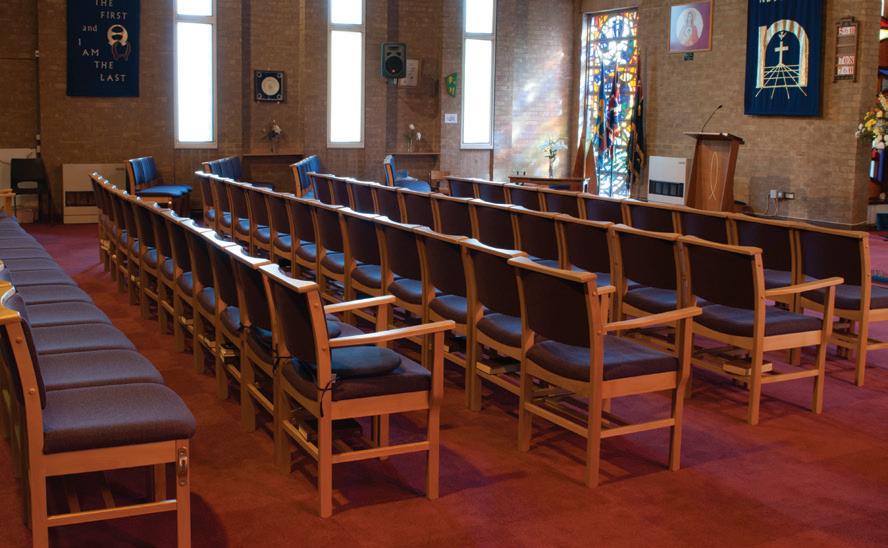


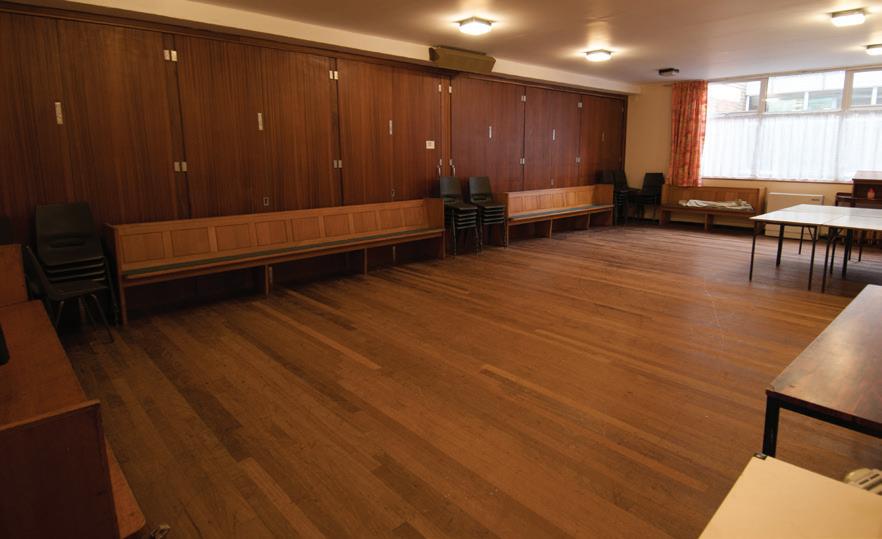
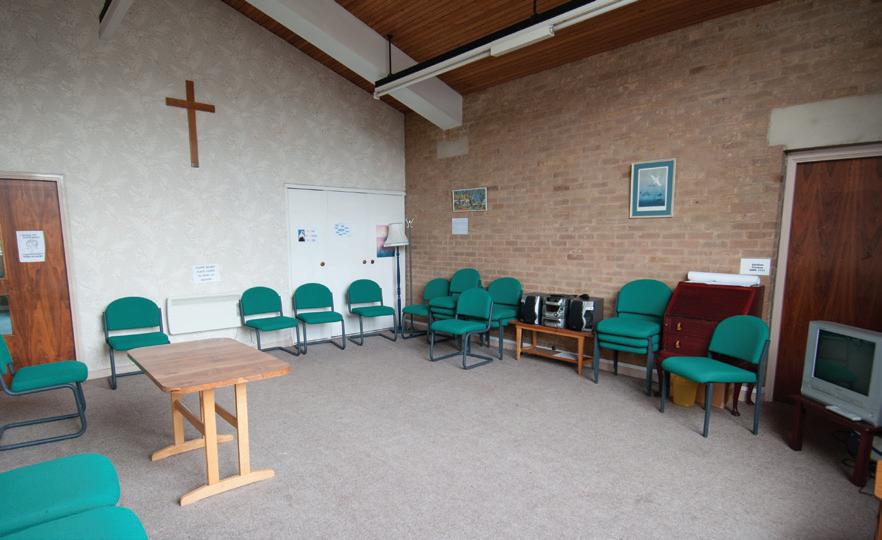

We have the ideal function room for you, conveniently located close to the end of the M62 with good public transport links and on site parking for 40+ cars. The majority of facilities including: Kitchen & Toilets are all fully wheelchair accessible.
To Enquire About Hiring A Rooms, Please Ring; 07453 358 157 or Use The Enquiry Form Upon Our Website: www.chmc.co.uk
